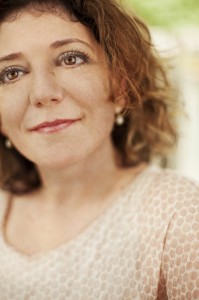Katie Steedly’s first-person piece [The Unspeakable Gift] is a riveting retelling of her participation in a National Institutes of Health study that aided her quest to come to grips with her life of living with a rare genetic disorder. Her writing is superb.
In recognition of receiving the Dateline Award for the Washingtonian Magazine essay, The Unspeakable Gift.
Enter your email here to receive Weekly Wide-Awake
We Are Not an Island: A Gratitude Conversation with Paula Salerno Herbert


KSC: For what are you grateful?
PSH: I am certainly grateful for my lifelong partner, Ken. We met when we were freshman, young fresh out of the can, in college. We became friends for years, 11 years, before we started dating. Then we were engaged shortly after that, and married shortly after that. At that time, we were like, if we want to have a family we better get our shit together and do this. My son Gus is someone who has taught me what it means to look through life through a different lens, and taught me how to understand that what makes someone grateful and happy for one person is not the same for another person. Because of his unique perspective on the world as someone who falls on the spectrum for autism. I am grateful for the fact that he shares his emotions with me without me prompting him. I am grateful that we had a whole day together where he did not feel like he was different. Those kinds of small moments for him. I saw him smile without him knowing. I am grateful that when he was not doing well in college we got a call from him, and not the university, telling me awful news. He said to me why aren’t you and Daddy mad at me? We were on the phone the three of us. “Well we could have been getting a very different phone call from the college and you reached out to us.” Like how incredible is that? You knew that at some point, regardless of being embarrassed or hurt or ashamed, that you could trust us enough that would not reject you in that moment. It is pretty powerful that he knew we would not reject him. It is pretty powerful when your child is an adult. Adultish.
KSC: How have you learned to take that deep breath and be grateful for those moments?
PSH: When you have a child that has other abilities. He is super smart. We never had to worry about him being smart enough. Now whether he got good grades is a whole other story. We never had to worry about his intelligence or whether he could cope intellectually with the world, but it is that social emotional piece that is always tricky. I learned that any time a typical parent would be celebrating I would be mourning. You say to yourself I can do this one of two ways. I can be sad for my whole fucking life by all the things that he does not do that other people see their people doing, or I can be happy for all the things he actually does. The things that we are proud of. The things that make him a funny person. The things that make him a thoughtful person. The kind of wins that he gets. You take those wins in a whole different kind of measure than you might otherwise take them. He gets a 1 in solo and ensemble because he composed a really cool jazzy piece on his own. We picked the right piano teacher that nurtured, that tolerated, and learned to work with his autism meltdowns in the middle of a piano lesson. To say, “Just breathe Gus. You got this.” He gets a 1 on it, an outstanding or whatever it is called, and he is thrilled by that, but you don’t say, “Oh! Now he can compose. Now he could do this or now he could do that. You just take that for what it is, and be happy in that moment, and try not to screw it up by saying something that makes him feel like it wasn’t enough like that one thing was not enough.
KSC: This ties in to gratitude and the notion of presence
PSH: Not letting the daily things go by without being cognizant of them. We can always focus on what is bad in our life. Everyday something shitty happens. Dammit. How do you get out from under that and wake up and say it is a new day? There are possibilities. That’s what I have learned in the last 20 years. Gus will be 20 in September. Maybe in part because of him. My gratitude for him and the life lessons I have learned because of him have been pretty powerful for me.
I am grateful for my parents because my mother at a certain point in her life said. “I love my family. I spent my time with my family. I did stay at home and raise the family, and then did things for myself.” And went back to teaching.
KSC: She was a teacher.
PSH: Yes. My mother and father both were educators. You know. It is that example. My mother. At 48. She changed her life. She said I can still be a mother and go back and be important and work and all of that sort of thing. My mother was a great example of what it means to be a working mother. She was my refuge when Gus was quite young. When I just did not know what the hell I was doing. She would go, “I will be there in five minutes can you hold your shit together for five minutes. I’ll be there you.”
KSC: How do you practice gratitude?
PSH: I am consciously, every day, making sure that I don’t let the little things go by without saying thank you, and not in a way that makes it seem like oh thanks you’re so nice but sincerely. If I screw something up. My field assistant will say, “Oh, we have got this going.” “Oh, my god I completely forgot about this. Not just saying “Oh yeah. That’s right.” but saying “Thank you for reminding me.” People don’t have to do things like that for you in your life.
Like in my campaign [for a Michigan Education Association leadership position], writing handwritten cards and not a form letter. It is honoring. We don’t live without other people’s help. We are not the island everybody says. The only way you are not going to become an island is if you continue to be personal with people. It is very easy today to not be personal. To be very impersonal. To send an email instead of making a phone call or going face-to-face with someone. It is that personal communication that you have. The learning someone’s name and continuing to call them by name. Then, if you forget it, instead of faking it through saying, “Oh my god. I am so sorry. I am blanking right now on your name. What is your name?” You are honoring them.
KSC: How did you learn that?
PSH: I learned it early on. I am not even sure. My dad remembered names really well. I happened to be hired into the same school district. After he had retired they started an elementary music program. The men and women who would come up to me, and talk to me, and talk about my father in a way that I would look at them and say, “Are we talking about the same guy.” The Good Saint Ned I used to call him. He was beloved. They would say, “I did not often like what he said, but I knew he was being honest with me and not mean.” “We may not have always agreed, but I always knew he was telling the truth.” Having that outside perspective of how other people view your parents is quite powerful. I consider it one of the greatest gifts I got in my life. I got to see my father through other people’s eyes for years. I worked and taught for twenty years in Frasier, and there was not a single year that I worked with somebody who did not know my dad. Every now and then I heard a story or a joke. I learned about why he was so tired when he got home, because he made his job and the people he encountered feel like the most important thing while he was there. Then when he came home he needed a rest so that he could make us feel the same way. He gave people his attention in the moment. That is gratitude. Right? That you don’t forget where you are. You take the time to be with them like they are the only person in the world.
KSC: You really care.
PSH: and you actually do.
KSC: You had that modeled your entire life.
PSH: My mother and father, both. I was one of five children. Every one of us. When we turned twelve we got to have a birthday dinner with our mom and dad. With five kids, you can imagine it was easy to get lost in the shuffle every now and then because we were pretty close in age. When you were twelve you could have dinner out at a restaurant with Mom and Dad on your own. You got to pick it out. Whatever you wanted to order, you could order. Every other dinner, when you go out to dinner you could buy anything that is $7 or less, and you can get any drink but you could get one pop. All of the constraints of having a large family. That was the night that you could have two pops.
KSC: Is there a connection between gratitude and creativity?
PSH: When you are creative, very often, you are not understood until someone identifies your creativity. Not only identifies it, but honors it and celebrates it. You start celebrating that in others and looking for that to champion them in the same way. Depending on where your path takes you, that idea of championing someone for what they are good at, or what you find marvelous about that person, becomes what you are known for. I think there is a correlation in that way.
KSC: Knowing your creative self and being connected to that allows you to be grateful for the essence of who you are and find that in others and connect with others there?
PSH: Their creativity may not be creativity at all. Their creativity might be that they are analytical. I need that person in my life. Thank you so much for being that person in my life to ground me, to give me the space in which to be a creative human being. Understand. We need all of that in the world.
KSC: Being a creative soul and connecting with that allows you to connect with and be grateful for the uniqueness in others. Whether it is creativity or analytical ability or physical, being able to be this amazing runner or this amazing architect.
PSH: As a leader, do you see a connection between gratitude and leadership?
KSC: Yes. It is really important that leaders are grateful for the people that they lead. Not just because they voted for them. Without their encouragement, without their voice, negative or positive. When I say encouragement, I don’t mean, “Oh hey. Good job.” I mean. [People say] “We need a leader.” “We need you to do this and we are behind you.” “We are offering you the good, bad and the ugly for you to consume digest and take charge of with our help.” Those are the stories that have to be told.
I use this analogy, geese fly in a triangle. The front goose is the lead, and the honking is because they are encouraging the one in the front. The reason geese honk is to ensure that the front one knows that there are still people behind him or her so that they know they are doing their job. Then when that goose gets tired, they fall behind and that goose starts to honk for the goose that became the front. In leadership, there aren’t people behind you telling you and giving you encouragement, but they are still following you. They know that the path the you are forging is the path that is right for them, and you don’t have to look behind to know they are making their presence known to you. If there are not people making the noise, letting you know they are there, you can’t go forward. There will be a time when I fly to the back, but I am grateful for the those that honk behind me to say, “Yes. We are behind you.” In that way, I am grateful for those I lead. They challenge me to be a better person, a better leader for sure, but a better person. I am not leading computers. I am not leading vehicles. I am leading people. You have to be acutely aware that we are inherently different. Everyone is an individual and the things that bind us have to be pointed out again and again and again and again. We lose sight of that.
I was just at the Representative Assembly where we had we passed a policy on charter schools. I was on the committee that wrote the policy statement. One of the things that I was such a huge advocate for, and made me a person who people said, “We hear you.” I just would not let it go. We had to organize no matter where they work because without the ability to feel, and I hate to use the words shielded or protected because it makes it seem like they are doing something wrong when they are not. Without the ability to have that contractual thing that says, “I am a professional. I stand up for students.” Regardless of whether I am the bus driver, the teacher, or the food service worker, without the ability to say I have the right to just cause. I have the right to protection so that I can say to a for profit charter school you are not doing right for these children. There are students in those classrooms no matter what. We can say we don’t want charter schools. We can say we don’t like charter schools. We can say we must be transparent. We can say this and that. All these things. Charter schools are here and the only way to make them better, or make them go out of business, is to protect worker’s voice for the good of the students. I am going to speak out.
KSC: Leadership, for you, is using your voice.
PSH: I believe that I am obligated to make sure that the good work that is being done across this country is being honored the way it should be. I am bound to that as a leader. I am bound to showing others how it should be honored. I must first honor it myself. I have to be the first person when you say, “Failing public schools.” To say, “You are talking about people who have dedicated their entire lives to public education, not because they wanted to get a good retirement, but because they want to change the lives of children.” I am grateful for that very day of my life.
That is why you have to tell the stories of the men and women that work in these schools. Tell their stories because then people are related. Then they are relatable.
KSC: The importance of telling the story and countering the narrative of failure. Bringing humanity back into the discussion of accountability of standards.
KSC: Can we learn gratitude?
PSH: I say, “Yes. Yes. Yes.” We are in a society that says, “Oh no big deal.” I hear it all the time. “You don’t have to thank me.” I do. I need you to hear it and honor it when it is given to you. “It was my pleasure to do it.” Saying thank you means something.
We have gotten to a place with civility. We have disconnected ourselves from owning our humanity that we don’t absorb the emotion of what it feels like to have someone say thank you. [I have recently taken a new job] people have had a dinner or bought a gift. I have done what I could to really cherish their gratitude for my leadership, my friendship, for the time I have spent with them. It is emotional to have people thank you. It should be. An authentic thank you is felt deep in the heart.
I am what [Malcom Gladwell] would call a connector. (That is from The Tipping Point) My girlfriends and others would say, “There is not a room full of people that Paula is not connected to about 50% of them.” I am going to make sure I find out what those connections are [with the other 50%].
KSC: Did you learn that from your Dad?
PSH: Storytelling is so powerful right. It is important in our private life and in our public life. I do really take that to heart. Which is why Facebook for me has been nirvana. I private message more than I openly shout out when it is something really important to me. The best part is to make the personal connection off site in the private message where you are free to share. I am free to share openly the importance of how it touched me you know. The luxury of private message is ingenious.
Read About Paula Here.
About Katie

From Louisville. Live in Atlanta. Curious by nature. Researcher by education. Writer by practice. Grateful heart by desire.
Buy the Book!
The Stage Is On Fire, a memoir about hope and change, reasons for voyaging, and dreams burning down can be purchased on Amazon.




